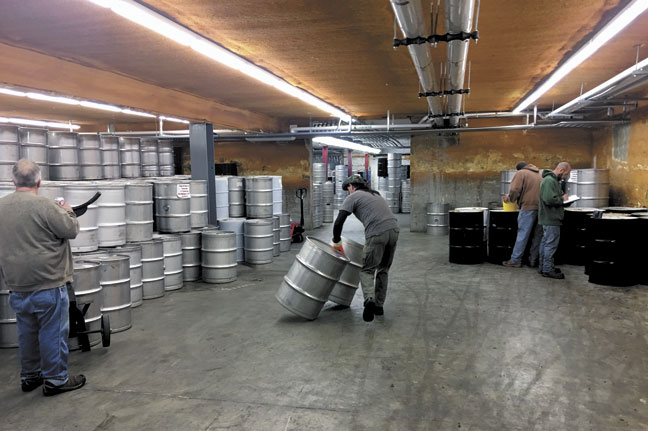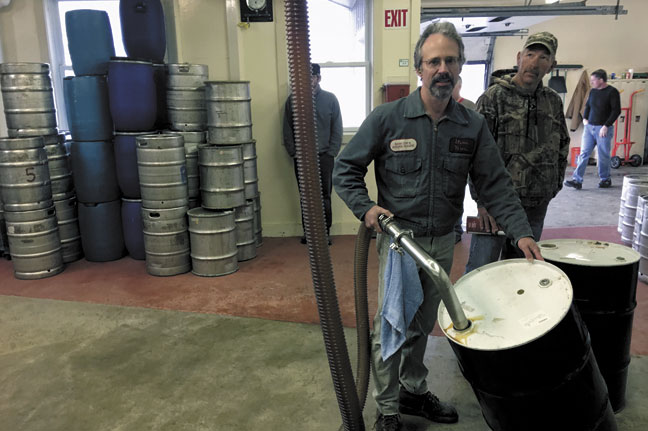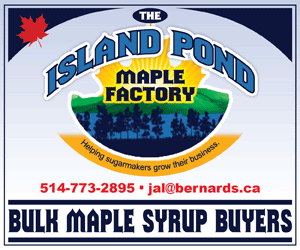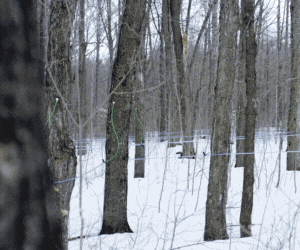Headlines
Record-breaking season floods bulk market
Average prices ranging from $1.85 to $2.10 a pound
By PETER GREGG | SEPT. 9, 2017
Bulk marketers are buried in syrup after two back to back record-breaking seasons in the United States.
“The bulk market is flooded,” said Bruce Bascom of Bascom Maple Farms in Alstead, N.H. “Absolutely flooded.”
Average bulk prices in the United States in 2017 are about $2.10 per pound for the lightest grades, $2.00 per pound for the medium and dark grades and between $1.60 and $1.85 for the very dark grades. Some buyers pay bonuses for organic.
Processing prices have completely bottomed out. Some are paying $1.25 per pound. But it’s as low as $1.00 per pound in some cases. And most bulk buyers have no use for it anymore and have tried to discourage its production.
While bulk buyers have long blamed the dropping bulk prices on a weak Canadian dollar, the situation this year is more tied to simple supply and demand. There is too much syrup in the marketplace for it to be eaten quickly, they said.
This year’s worldwide crop is upwards of 200 million pounds, and sales are in the neighborhood of 165 to 180 million pounds, experts say.
Bascom said he has so much syrup it will take well into the fall before he can even create enough capacity in his holding tanks in Alstead to store it all. As of now he said he has upwards of 80 tractor trailer loads worth of drums sitting in sugarhouses in the field.
Bascom said he started the season with three month’s worth of carryover from the 2016 season, which was the biggest in modern history. He said he expects next season will also be a carryover, despite brisk sales.
Not much different in the Midwest where Anderson’s Maple, run by Steve Anderson, has closed the door on new syrup from new sugarmakers.
“Yes, still taking, but only from current customers at this time,” Anderson said.
Anderson is becoming known as one of the nation’s best marketers and his syrup brand is showing up on store shelves from coast to coast. He said once again syrup sales are up this year, but he said it is too early in the marketing season to tell just how much.
David Marvin of Butternut Mountain Farms in Morrisville, Vt. said the industry is in a mixed bag situation.
Prices are down on the bulk side, but sales on the retail side are very strong. Consistently, retail has improved 10 percent year after year and that trend continues.
“I’ve always been an optimist about the maple business and I am still optimistic,” he said.
“In the short term we have a challenge in that there appears to be more syrup available in the market then we are able to sell,” he said.
Marvin said the retail side of the industry will catch up to the expansion, but it may take a couple of years to do it. Maybe even just one year if there is a short season.
Producers should expect bulk prices to stay low for at least another season.
“I don’t think the prices improve until the barrels clear,” Bascom said.
Meanwhile, more and more sugarmakers are trying their hand at selling their own syrup, either right out of the sugarhouse, peddling it to local retail accounts or selling online.
This spring there was an industry-wide shortage of quart sized plastic containers—dealers were out of them pretty much everywhere—indicating that sugarmakers were packing more of their own syrup.
Peter Haas, president of Hillside Plastics, Inc., the makers of Sugarhill Containers, said his company has recently completed a major expansion at their plant in Turners Falls, Mass. just to keep up with the higher demand for containers.
“We’re feeling pretty optimistic and pretty good about the whole marketplace,” Haas said. “We have seen more longer term producers as well as new ones doing private label product.”

































